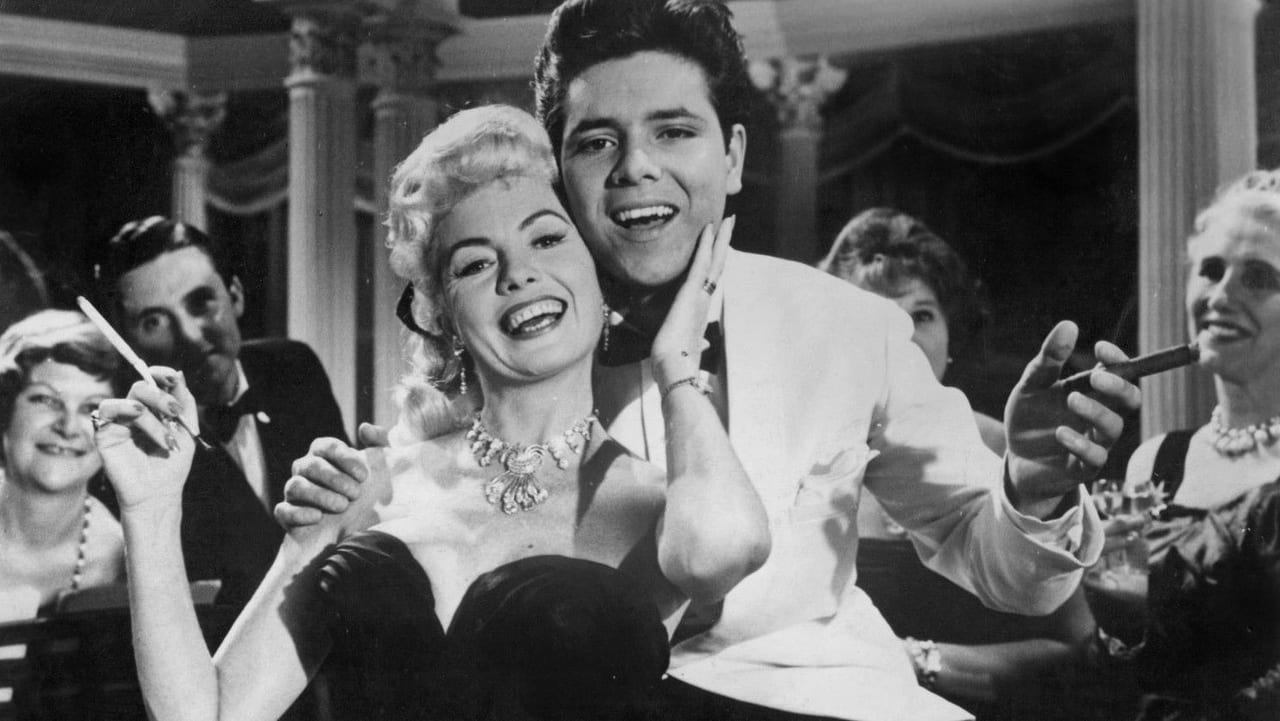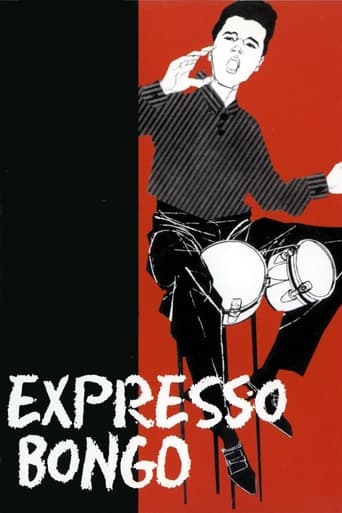Linbeymusol
Wonderful character development!
Steinesongo
Too many fans seem to be blown away
Tacticalin
An absolute waste of money
mraculeated
The biggest problem with this movie is it’s a little better than you think it might be, which somehow makes it worse. As in, it takes itself a bit too seriously, which makes most of the movie feel kind of dull.
dont_tell_duncan
This was actually much better than I thought it could have been. And for a younger viewer it provides a snapshot of how Cliff really was once hip, belying his now ubiquitously and perennially uncool image. However, not being any sort of director or producer, it is very rare I ever have an insight of how I would remake a film. In the right hands, though, you sense the germs of a story that could have been executed with far more pathos - in the manner of say, a 'Darling' or even an 'All About Eve'. Entertaining as it is, it falls far short of being even the best Cliff film.Lawrence Harvey is - for the first time that I've seen - badly miscast as the sleazy agent with a heart. He never quite gets to grips with the deeper layers of the amoral Johnny Jackson and the accent flits around hopelessly compounding the problem. You imagine what a Dirk Bogarde or even a young Peter Sellers might have done with such a role? Yolande Donlon portrays 'American star' on autopilot and the sexual tension is far too underplayed (although probably a fear of the censors more than anything else). Cliff is reasonably endearing, but is laughable as any sort of 'British Elvis' - one watch of King Creole (which this film surely owes a lot to) demonstrates Elvis as a far superior actor, albeit one who was never really given a chance to shine. He also inevitably always managed to wear his outfits - however outlandish - with far more panache than the embarrassing costumes Cliff is forced to don (check out the swimming trunks/shoes/socks combo!). Only Sylvia Syms is amiably convincing, but is never really given adequate chance to shine in the role of stripper-with-a-heart Maisie King.At the root of the problem is a makeshift script which suffers from not knowing what it wants to be? Is it a morality tale? Light entertainment? A document of a short era of London's youth culture? Or simply a quick buck being made off what I imagine was expected at the time to be Cliff's fleeting popularity? Whilst there are flashes of wit and the odd great scene, these are counterbalanced by irrelevant unfunny scenes (such as those involving the inexplicable buffoon children of Donlon's publicist?) and insufficient background characterisation of all the leads. It also lacks sufficient songs of a quality which could help carry it - only Voice In The Wilderness even vaguely stands up as credible, and even then it's not exactly 'edgy'.In short it's not by any means the worst way to spend 90 mins on a Sunday afternoon or suchlike, but you may end up wishing for what could have been so much more...
LHL12
I saw Expresso Bongo on cable TV back in 1979 and thought it was marvelous. So I was thrilled when I learned that it would finally released on VHS, though only in the UK, in the mid-1990s. My favorite scene, of course, was the comical highlight. Laurence Harvey is in the record producer's office, he drops the needle on a disc, the gramophone starts playing music, and the two of them strike up a song called 'Nausea'. They get so carried away that they take the song with them out onto the street, where they dance down the sidewalk. Now that I could at last own my own copy and luxuriate in lovely memories, I ordered a copy right away (I had PAL equipment even back then), it arrived by overseas air mail, and I was mortified to see that the 'Nausea' song was entirely missing. I was astonished at how bad the movie was without that sequence.Since the video derived claimed copyright by the Rohauer Collection, I called Tim Lanza of Rohauer (it was one of two times I ever contacted him) to ask what had happened. He was surprised by the news. He had not seen the VHS, but he assured me that he was familiar with the film and that the song was certainly included in his 35mm prints. He told me that Kino had also licensed VHS rights, and he wondered if they would include or delete the song. He surmised that perhaps there was a rights tie-up issue with 'Nausea' that prevented its use on video, but he really didn't know.So I wrote to Wolf Mankowitz (yes, I knew him personally, and his wife Ann) and asked if he could intervene. He wrote back saying that the film's producer, Val Guest, had in his old age acquired the only vice he had not known in his youth: stupidity. He had sold all rights to the film for a pittance and now neither Val nor Wolf had any control over it whatsoever.At the Syracuse Cinecon shortly afterwards, I asked Jessica Rosner if the Kino edition of Expresso Bongo was complete. Of course it was, she said, as if by reflex. But then she stopped for a moment, and remembered that Kino had received a letter from an irate customer complaining about a missing scene, but that nobody at Kino took that letter seriously, because there was no hint of any deletion in the 35mm print they had used, and the running time exactly matched the running time as originally announced in 1959. My heart sank. I told her about the British VHS, and she said, yes, Kino had used precisely the same 35mm source that the British VHS had derived from. I told her and others at Kino that Tim Lanza of the Rohauer Collection had that scene and that they should go to him for any reissues. Other Kino staff by then had become fed up with me, saying that sales had been poor and that any further restoration would not be financially viable. End of story.A few years later, in 2002 I think, I met with some movie-buffs at a restaurant in Manhattan. One fellow at the table, whose name I can no longer recall, was an employee of Kino's new DVD division. I asked him if the recent Expresso Bongo DVD was finally complete. He smiled from ear to ear and said that he and others had crawled through all the archives in England but could not find a print with the 'Nausea' song, and so, no, sadly, the DVD was the same as the VHS. I shouted back: 'TIM LANZA HAS IT!!!! WHY DIDN'T YOU ASK TIM LANZA? HE'S THE COPYRIGHT HOLDER!' My outburst made no impression.According to rayshaw44 who posted a query to the IMDb bulletin board, there are two other songs missing as well: 'I Never Had It So Good' and 'Nothing Is for Nothing'. He could well be right!Face it. Now with two VHS editions and a DVD edition that are all butchered, Expresso Bongo has a new 'definitive' version, and chances that more than a handful of people will ever see the complete edition are vanishingly small. Unless, of course, we want to pool our resources, license the film, and issue our own DVD when the other video licenses expire. Anyone interested? rjbuffalo@rjbuffalo.com
Pamela-5
This is kind of an annoying low-budget film, but at least I, an American, got to see what the fuss used to be about the UK singer Cliff Richard, whom I had never seen before. I also have never seen Lawrence Harvey in a semi-comedic role. He seemed as if he were on speed, or coke; very annoying. I kept yelling, "Give the guy a Valium!" And his accent drifted from plummy English to South African to European Yiddish, and back again. Most disconcerting.But watch the film for future celebs! There's Hermione Baddley (who was on "Maude"), playing a street-walking prostitute (!), there's Burt Kouwk (who played Cato in all those Pink Panther movies), playing a dissolute Soho youth, and Susan Hampshire ("Upstairs, Downstairs," and various TV movies).The film's depiction of Soho reminded me of old American films' depictions of 42nd St. in N.Y. Really cheesy.And apparently there wasn't too much censorship of British films then, because we see in this film lots of true female nudity (the strippers in the film). Man, I haven't seen breasts like those in ages! (All natural, all non-augmented.) See this as an interesting historical time capsule.
eye3
It's really about a hustler-turned-agent (Laurence Harvey) and how opportunity comes (and passes him by) via his finding (and losing) the kid-with-talent (Cliff Richard). A scene I liked was where the agent and the label exec (Meier Tzelniker) shamelessly discuss their plans for Bongo Herbert's future - i.e., what can he do for them, never mind what he can do for himself.This might have been a much more memorable movie with a bit more backing and some rewrites. It starts (and ends) by taking us to the cruddier side of London ca. 1960 - strippers, noisy streets, the grime, the neon-lights - all of it filled with the never-was's and the never-will-be's hoping against hope for That One Break. No U.S. movie at the time would ever have thought of this, whereas this U.K. movie did so without any Hollywood-esque qualms about "how will it play in Peoria?"Strange to think: when this movie, about a young rocker getting started, was released there was a band of Liverpool kids who got a gig in a dive on the Hamburg Reeperbahn ...One last bit: check out an uncredited kid named Susan Hampshire. She has four lines but she ante-dates Monty Python's "Upper-Class-Twit-of-the-Year" sketch by 10 years - she does it to a t.

